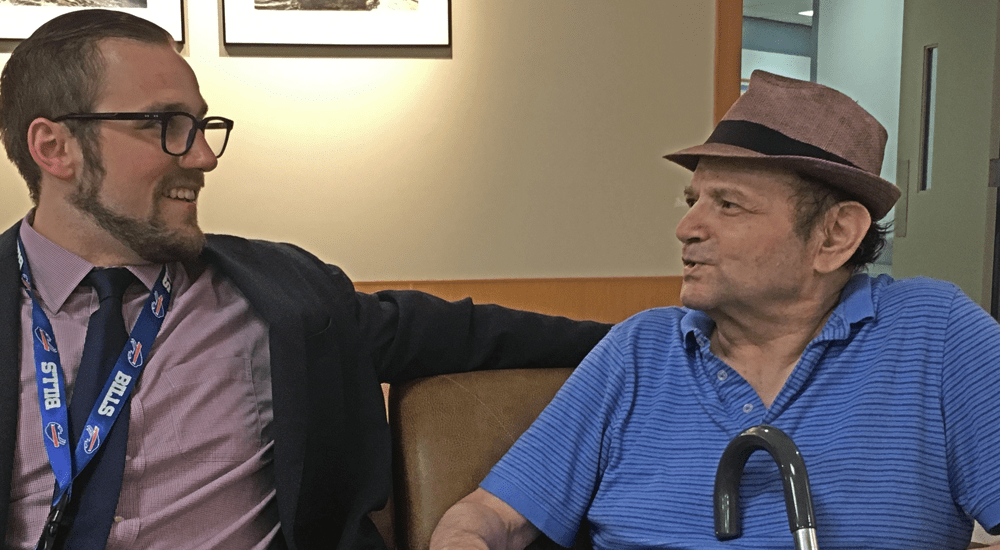Army Vietnam Veteran Donald Weiss was not always prone to depression. In fact, there were years when he loved his life. (He is pictured above (right) with VA’s Dr. Justin Piershalski.)
His voice picks up when he recalls the 20 or so years he was in and out of acting. His sense of humor is revealed when speaking about his role in a TV commercial. He and three other actors played the part of admen for a car competitor who was frustrated when their vehicle couldn’t make it up an Arizona peak. “I had one line,” Weiss says.
Also dressed as an Army sergeant and wearing an apron, he once was in an ad for a spaghetti sauce.
A Baruch College graduate, Weiss was drafted into the Army at age 21. Based in Pleiku, Vietnam, he served as a personnel management specialist. “It was OK. I was in danger but nothing really happened to me.”
“New experience” helps him feel better.
After an honorable discharge, Weiss worked in personnel management and then as a welfare investigator. Living in the West Village, he went to acting school. “I was bored and needed something and I saw an ad in the Village Voice.”
He developed a career acting in commercials and summer theater over the next two decades. He was also an acting teacher at HB Studio. A particularly rewarding time of his career was when he played David Letterman’s roommate Bob in a long-running series of TV skits.
In the 1990s, Weiss was living in California, feeling very isolated, and fell into a deep depression. He returned to New York and was hospitalized several times over the next 15 years.
Weiss says the support offered by his cousin Brian Lawrence has been critical to his survival. “I’d be nowhere without him.” In 2014, Brian’s mother was concerned about a very disturbing phone call from Weiss telling her he thought he would be “departed” soon.
A good candidate for Electro Convulsive Therapy
Brian, who had been an advocate for his own father who suffered from mental illness, visited Weiss and saw an immediate intervention was needed. Weiss was hospitalized for two months. But seeing no improvement in his cousin, Brian says he came up with the idea of Electro Convulsive Therapy (ECT) for his cousin because he remembered his uncle had been treated with ECT with good results.
As a patient for whom other treatments did not seem to have success, Weiss was considered to be a good candidate for ECT. He was apprehensive but open to taking a chance. “It was a new experience,” he says. After a few treatments, he says he started to feel better. He also takes a lot of medication “for everything.”
The first treatment in 2015 did have good results but he relapsed into depression which was compounded by cancer and Parkinson’s diagnosis that followed in the next few years.
Since his second treatment, Weiss has felt upbeat enough to take walks and has found a new and helpful interest in spirituality.
“I’ve become an observant Jew,” he says. He regularly attends services locally and occasionally will go out to lunch with his cousin. This is a big positive change.
“Donald is also an old movie buff, watching Turner Classic Movies on a daily basis,” says Brian.
ECT effective treatment for depression
Dr. Justin Piershalski, a VA psychiatrist specializing in ECT, says Weiss is a good example of a patient who has benefited tremendously from ECT when nothing else worked. “The ECT of today is not the ECT of the fifties or the ECT of the movies,” says Dr. Piershalski, with the VA New York Harbor Healthcare System.
“Extensive research and experience have allowed us to deliver what remains the most effective treatment for depression with minimal memory impairment and side effects in the large majority of cases.”
He explains that, essentially, a patient under anesthesia, feeling nothing, receives a small electrical charge which induces a seizure which stops after a short time. This process is repeated 6-12 times over 3-4 weeks with the goal of achieving remission of depression. The effect can be profound for many people. After the treatments, the goal is to maintain the patient’s gains with medication and therapy.
“Dr. Piershalski is really very caring and most importantly communicative,” says Brian, commenting on the care his cousin has received.
Topics in this story
More Stories
The Medical Foster Home program offers Veterans an alternative to nursing homes.
Watch the Under Secretary for Health and a panel of experts discuss VA Health Connect tele-emergency care.
The 2024 National Veteran Suicide Prevention Annual Report provides the foundation for VA’s suicide prevention programs and initiatives.






